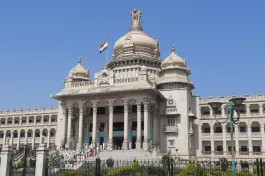The recent judgement of the Supreme Court of India declaring the electoral bond scheme (EBS) as unconstitutional has brought the issue of the role of money in politics to the centre-stage in public discourse. Public memory is known to be short and therefore we seem not to remember that the connection between money and politics is very old.
Political theorists have pointed out that there has been a connection between money and politics throughout history. For instance, Hannah Arendt (1951) argued that in the 17th century, nascent city-states depended on the active support of moneyed people who placed their capital at the service of the prince in return for preferential treatment. Arendt’s thesis is that while this facilitated the survival of the princes and later the emergence of monarchies, its impact on the politics of the state is debatable.
Interestingly, at the end of the first decade after India's independence, Justice M.C. Chagla, then chief justice of Bombay High Court, expressed his doubts about the impact of business on politics in a democracy. Justice Chagla’s observations in 1957 in Jayantilal Ranchhoddas Koticha, where a proposal by the Tata Iron and Steel Company to make contributions to political parties was being adjudicated, are worth citing at length:
Now, democracy is a political system which ensures decisions by discussion and debate, but the discussion and debate must be conducted honestly and objectively and decisions must be arrived at on merits without being influenced or actuated by any extraneous considerations. On first impression it would appear that any attempt on the part of anyone to finance a political party is likely to contaminate the very springs of democracy. Democracy would be vitiated if results are to be arrived at not on their merits but because money played a part in the bringing about of those decisions. The form and trappings of democracy may continue, but the spirit underlying democratic institutions will disappear. History of democracy has proved that in other countries democracy has been smothered by big business and money bags playing an important part in the working of democratic institutions and it is the duty not only of politicians, not only of citizens, but even of a Court of law, to the extent that it has got the power, to prevent any influence being exercised upon the voter which is an improper influence or which may be looked at from any point of view as a corrupt influence. The very basis of democracy is the voter and when in India we are dealing with adult suffrage it is even more important than elsewhere that not only the integrity of the representative who is ultimately elected to Parliament is safeguarded, but that the integrity of the voter is also safeguarded, and it may be said that it is difficult to accept the position that the integrity of the voter and of the representative is safeguarded if large industrial concerns are permitted to contribute to political funds to bring about a particular result.
Justice Chagla went on to say, “It is a danger which may grow apace and which may ultimately overwhelm and even throttle democracy in the country.”
The similarity between the views of Hannah Arendt and Justice Chagla are striking.
Money and politics before Independence
The relationship between money and politics existed in India even before India became an independent country. Leading industrialists such as G.D. Birla and Jamanlal Bajaj provided financial support to M.K. Gandhi and the Indian National Congress. Venu Madhav Govindu writes:
Gandhi did have close personal relationships and accepted financial contributions from capitalists such as Ambalal Sarabhai, Jamnalal Bajaj and Ghanshyam Das Birla. But it would be incorrect to infer that such associations meant that Gandhi only promoted the interests of big business.
Govindu continues:
By the late 1920s, unable to ignore the growth of nationalism, India’s capitalists began to build an uneasy and cautious alliance with the Congress. GD played a special role in this entente and walked the tightrope of maintaining equations with both the Raj and the Congress.”
Post-Independence
The relationship continued post-Independence as the Congress continued to dominate the political scene in the country.
A remarkable event occurred in 1961 with the formation of the Swatantra Party led by C. Rajagopalachari. As Ramachandra Guha has written, Rajagopalachari, who knew that the Tatas supported the Congress financially, wrote to J.R.D. Tata in May 1961, soliciting financial support for the Swatantra Party, with the logic that a strong, democratic opposition party was necessary for democracy to be effective in the country.
Agreeing with the logic of Rajagopalachari, Tata agreed to support the Swatantra Party financially and, at the same time, decided to inform Nehru about it, describing the logic in some detail. While expressing his concern at “the total absence of an responsible and organised democratic opposition,” to the Congress, Tata went on to say:
I am one of those who believes that the single party regime under which we have lived since Independence has been up to now a good thing for the country as it has provided the stability and the means of concentrating the national energies and resources on orderly development, which would have been impossible without a strong and continuing administration.
Hoping that even Nehru would agree, Tata went on to write, that if single party dominance continued:
“Indefinitely this situation contains the seeds of trouble and risk in the future. However good any political party and its administration may be, it is inevitable that people will ultimately want a change and that some elements in the political life of the country will come to disagree with some of the Congress Party’s policies and seek the means of trying out their own ideas”.
In conclusion, the Tatas had decided that “in addition to continued support to the election funds of the Congress we should also contribute, although on a lower scale, to the funds of the Swatantra Party.”
Remarkable as Tata writing to Nehru was, Nehru’s response was no less. Replying, as Ramachandra Guha says, “almost immediately,” Nehru told Tata, “You are, of course, completely free to help in any way you like the Swatantra Party,” but added: “I do not think that your hope that the Swatantra Party will emerge as a strong Opposition is justified. I think it will be disappointed at the turn of the next General Elections. It seems to be that it has no roots in the thinking of either the masses of India or the greater part of the intelligentsia.”
Corporate financing of politics
After the sudden death of Prime Minister Lal Bahadur Shastri in Tashkent in 1966, Indira Gandhi was chosen as his successor by the ruling Congress party. However, there were serious ideological differences between Indira Gandhi and a group of senior Congress leaders, commonly referred to as the Syndicate, who controlled the Congress Working Committee. Matters came to a head over the election of the president of India, which the Syndicate had proposed N. Sanjeeva Reddy. The group led by Indira Gandhi backed an independent candidate, V.V. Giri, then the vice president. As a result, Indira Gandhi was expelled from the Congress in 1969 for violating party discipline.
This somewhat detailed description of this well-known split in the Congress is a backdrop for the fact that in 1969, the Indira Gandhi government deleted Section 293A of the Companies Act, thereby imposing a complete ban on corporate donations to political parties. One of the ostensible reasons for this was to break the nexus between businesses and politics. Another reason possibly was to weaken the rising popularity of the Swatantra Party, by choking the funds it was attracting from the corporate world.
In 1969, the Indira Gandhi government deleted Section 293A of the Companies Act, thereby imposing a complete ban on corporate donations to political parties.
This has often been considered to be a watershed event in the evolution of the money-politics nexus in India. Political parties sought to beat the ban by a variety of ways in which the corporate world became an active accomplice. Parties resorted to publishing ‘souvenirs’ in which corporates placed advertisements, often surrogate, and paid large sums of money to parties. It was also the period of the so-called licence-permit raj and corporates participated in the underground exchange of money, often referred to as ‘briefcase politics’. The ban was finally lifted in 1985 by another Congress-led government headed by Rajiv Gandhi.
Legal provisions
As can be expected, legal provisions have evolved in keeping with political developments. Here is the general sequence.
The Companies Act, 1956, had this to say about corporate donations to political parties:
293A. PROHIBITIONS AND RESTRICTIONS REGARDING POLITICAL CONTRIBUTIONS:
(1) Notwithstanding anything contained in any other provision of this Act, -
(a) no Government company ; and
(b) no other company which has been in existence for less than three financial years, shall contribute any amount or amounts, directly or indirectly,
(i) to any political party ; or
(ii) for any political purpose to any person.
(2) A company, not being a company referred to in clause (a) or clause (b) of sub-section(1), may contribute any amount or amounts, directly or indirectly, -
(a) to any political party ; or
(b) for any political purpose to any person… (Italics added).
Corporate contributions to political parties were kind of regulated for the first time in 1960 through an amendment, the operative part of which said:
(b) after sub-section (5), the following sub-sections shall be inserted, namely:— (6) Every company shall disclose in its profit and loss account any amount contributed by it under clause (e) of sub-section (2) to any political party or for any political purpose to any individual or body during the financial year to which that account relates, giving particulars of the total amount contributed and the name of the party, individual or body to which or to whom such amount has been contributed. (7) The provisions of this section in so far as they relate to contributions made by a company to any political party or for any political purpose to any individual or body shall also apply to a private company which is not a subsidiary of a public company [Italics added].
This was before Indira Gandhi's ban on corporate donations to political parties.
Another significant development which had a tangential impact on corporate donations to political parties occurred in 1978 when the Income Tax Act was amended to exempt the income of political parties through voluntary contributions.
Then, in 1985, came the lifting of the ban imposed in 1969 by another Congress-led government.
This is how matters stood till 2013 when two developments happened. First there was the introduction of the Electoral Trusts scheme with effect from 31 January 2013. Under the scheme, any company could set up an Electoral Trust and make donations to this trust and also accept donations from other corporates. The main condition was that 95% all donations received during a year had to be donated to political parties in the very same year, and the trust could retain only the remaining five per cent for its administrative expenses. Both the donors and recipients were to be eligible for tax deductions.
The other, and much more important, development was the enactment of a new Companies Act 2013. Corporate donations to political parties were dealt with under Section 182, the relevant parts of which are reproduced below:
182. Prohibitions and restrictions regarding political contributions — (1) Notwithstanding anything contained in any other provision of this Act, a company, other than a Government company and a company which has been in existence for less than three financial years, may contribute any amount directly or indirectly to any political party: Provided that the amount referred to in sub-section (1) or, as the case may be, the aggregate of the amount which may be so contributed by the company in any financial year shall not exceed seven and a half per cent of its average net profits during the three immediately preceding financial years: Provided further that no such contribution shall be made by a company unless a resolution authorising the making of such contribution is passed at a meeting of the Board of Directors and such resolution shall, subject to the other provisions of this section, be deemed to be justification in law for the making and the acceptance of the contribution authorised by it. [...] (3) Every company shall disclose in its profit and loss account any amount or amounts contributed by it to any political party during the financial year to which that account relates, giving particulars of the total amount contributed and the name of the party to which such amount has been contributed. (4) If a company makes any contribution in contravention of the provisions of this section, the company shall be punishable with fine which may extend to five times the amount so contributed and every officer of the company who is in default shall be punishable with imprisonment for a term which may extend to six months and with fine which may extend to five times the amount so contributed. Explanation.—For the purposes of this section, ―political party means a political party registered under section 29A of the Representation of the People Act, 1951 (43 of 1951) [Italics added].
The major change was the capping of corporate donations to political parties at seven and a half per cent. of its average net profits during the three immediately preceding financial years.
Enter electoral bonds
This was the situation when the Electoral Bonds Scheme (EBS) was introduced by the government of the day in the budget of 2017-18. A lot was written at the time in the public domain on the problems anticipated with the scheme. A public interest litigation (PIL) was filed in the Supreme Court on 14 September 2017. The judgement came on 15 February 2024, declaring the entire scheme as unconstitutional, and undoing all the amendments that had been done as part of the EBS.
There was considerable consternation and struggle over the implementation of the Supreme Court judgement with the State Bank of India seemingly resisting the implementation of the judgement.
A clear and unambiguous outcome of the EBS and its aftermath is that the existence of the business-politics nexus has been conclusively proved beyond any doubt. It is also clear that the scheme was been designed in active consultation with the corporate sector. As a matter of fact, a very senior government official who was actively involved in designing the EBS, said in a TV interview, while describing the botched attempt at trying to show that the bonds were actually unidentifiable, that “The buyers demanded this as a pre-condition for using this scheme for giving donations” (19:07–19:15) (Italics added).
A clear and unambiguous outcome of the EBS and its aftermath is that the existence of the business-politics nexus has been conclusively proved beyond any doubt.
The information revealed by the data disclosed by the SBI under strict directions from the Supreme Court is very vast and expansive, the analysis of which will take a very long time. These efforts are ongoing as can be seen by this recently published piece, one of many analyses. Efforts at undoing the Supreme Court judgement are still on. A review petition has been filed against the judgement, and several writings in the media have tried to show that the judgement is not in the public interest.
What next?
This is a difficult question to answer, but there is no escape and it has to be faced. Considering the electoral bonds saga as it has unfolded till now and all that had gone on before the EBS, it is clear that the business-politics nexus is here to stay; it is not going anywhere.
If there were any doubts in anyone’s mind, they should have been laid to rest first by the praise that Prime Minister Narendra Modi heaped on the EBS, in a TV interview ((53:40–54:40), even going to the extent of saying that those who were “dancing and rejoicing” at the EBS being declared unconstitutional by the Supreme Court would “come to regret it”.
The prime minister made the above comment on 31 March. Less than a month later, on 20 April, Finance Minister Nirmala Sitharaman, said in an interview to a national daily that the Bharatiya Janata Party (BJP) intended to bring back electoral bonds in some form after consultations with all stakeholders if it was returned to power in the 2024 general elections.
Given this clear and unambiguous declaration of intent by the current ruling party, it is clear that since the corporate sector obviously appears to be a willing party to this seemingly mutually beneficial quid pro quo arrangement, the situation is unlikely to change in a hurry.
On balance, it seems the business-politics nexus is likely to continue. All that can be hoped is to nudge it in the direction of becoming more and more transparent.
Since the country is in the middle of a general election, it is not out of place to speculate what might happen if the party in power at the centre changes as a result of the election. The legal changes in the past in the rules for business donations to political parties give us some clues. It seems clear that most parties are willing to compromise, to arguably differing extents, to raise money. It is worth noting that only one political party filed a petition against the EBS, though many, almost all, supported the decision of the Supreme Court.
On balance, it seems the business-politics nexus is likely to continue. All that we can hope for is to be able to nudge it in the direction of becoming more and more transparent, so that voters can make an informed choice, knowing which political party or candidate is getting money from whom.
The reluctance of both, political parties and corporates, to be transparent is well known and the reasons why it is eminently possible and desirable are also well known. To recapitulate briefly, at the time of demonetisation, the whole country was exhorted to make payments digitally. It was said that the country is moving towards being a digital economy. India is now the world leader in digital payments via UPIs (Unified Payment Interfaces). There does not seem to be any conceivable reason why political parties cannot accept all their donations and make all their expenses digitally. That would automatically make the whole thing transparent.
In the end, perhaps that best that can be done is to remind all of us, including political parties and the corporate world, of the prescient observation that Justice M.C. Chagla in 1957:
Democracy in this country is nascent and it is necessary that democracy should be looked after, tended and nurtured so that it should rise to its full and proper stature. Therefore any proposal that or suggestion which is likely to strangle that democracy almost in its cradle must be looked at not only with considerable hesitation but with a great deal of suspicion (Italics added).
The last word
After all that has been said, we need to remember that all the money that political parties declare as their income and that they declare as their election expenditure, represents only a very small, some might even say a minuscule, proportion of the total amount involved in the political and electoral activity in the country. One fact supporting this inference is that when the income tax returns of political parties were made public in 2015, as a result of RTI applications, it was revealed that 80% of the income that political parties declared in their income tax returns was from unknown sources.
More recently, in the public debate over the Supreme Court judgement on electoral bonds, a former secretary to the government of India, who was closely involved in the formulation of the EBS, said: “We don’t have exact estimates but my sense is that the electoral bonds didn’t fund more than 5–10% of the total or more than 10% of the total election related expenditure which is much more. So, there is an enormous amount of black and other corrupted money which is in the system.”
Jagdeep S. Chhokar is a concerned citizen.









